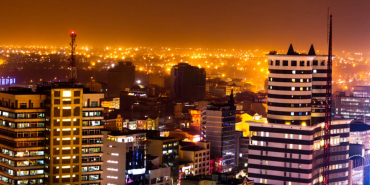Economic Hardship Reshapes Kenya's Easter Travel Patterns

Kenya’s hospitality industry experienced a significant downturn this Easter holiday, as economic challenges dampened consumer spending and altered travel patterns.
The subdued festivities reflect a broader economic strain affecting both businesses and households, prompting a cautious approach to leisure and discretionary spending. Hotel occupancy rates saw a marked decline compared to previous years. Travellers Hotels Group, a major industry player, reported a drop from 90% occupancy in Easter 2022 and 2023 to 72% this year. General Manager Hillary Siele attributes the decrease to shrinking disposable incomes and rising costs, which have curtailed consumer enthusiasm for travel and leisure.
“The numbers are telling,” Siele said. “People simply aren’t spending like they used to, and it’s affecting us all.”
In response to the downturn, hotels have implemented aggressive price reductions and promotional strategies to attract guests. Despite these immediate challenges, industry experts caution against viewing the Easter slowdown as indicative of a larger crisis. Mike Macharia, CEO of the Kenya Association of Hotel Keepers and Caterers (KAHC), offers a nuanced perspective, noting that Easter in Nairobi has historically been a slower period for hotels as residents often travel upcountry or to coastal destinations.
“This is not a new trend,” Macharia stated. “Easter has always been quieter in Nairobi. It’s not an anomaly, and it shouldn’t be used to generalize the performance of the entire hospitality sector.”
Macharia emphasises the importance of evaluating long-term trends, pointing to the industry's broader achievements, including a record-breaking 2.4 million international visitors in 2024. He also highlights ongoing efforts by the Ministry of Tourism to further increase arrivals, with a target of five million visitors in the coming years. Recent developments, such as the addition of new international flight routes from India, Kuala Lumpur, and Dubai, as well as the return of Turkish Airlines in June, are considered promising signs of growth.
“These are not minor achievements,” Macharia stated. “They signal a positive trajectory for the industry, despite the challenges of the moment.”
At the Coast, however, the Easter season presented a more positive outlook. Aggressive marketing campaigns and special offers by coastal hotels drove increased bookings in the region, highlighting the adaptive strategies employed by businesses to align with shifting demand patterns. Even in these areas, economic pressures remained an underlying influence on consumer choices and spending habits.
Kenya’s economic landscape has been marked by persistent hardships in recent months, with rising costs of living and controversial fiscal policies placing considerable strain on households. Economist Samuel Nyandemo attributes much of the current financial pressure to “abnormal” taxation policies and escalating prices for essential goods and services. He describes a widespread contraction in economic activity, with many citizens forced to prioritise necessities over discretionary spending.
“Kenyans are being pushed to the brink,” Nyandemo observed. “Leisure and travel are increasingly becoming luxuries that only a select few can afford.”
The impact of these challenges has been particularly evident in domestic travel patterns. Airfare prices surged in the lead-up to Easter, reflecting heightened demand. Kenya Airways tickets from Nairobi to Mombasa reached as high as KSh17,100, while flights to Kisumu averaged KSh16,300. While these routes operated near full capacity, the costs acted as a deterrent for many potential travellers. The Madaraka Express, a popular rail service, also saw full bookings during the period, with its more affordable fares offering a respite for some families.
Nevertheless, the financial strain on households remained palpable, limiting the overall volume of leisure travel. Supermarkets across Kenya attempted to ease the burden on consumers by offering discounts on Easter essentials, enabling families to celebrate the season more affordably. Yet, for many, even these efforts fell short in the face of mounting expenses. With schools set to reopen soon after Easter, parents were forced to make tough choices, prioritising education over holiday indulgences.
Nyandemo highlights the growing discontent among the public regarding fiscal policies that have exacerbated economic inequalities. “The cost of living crisis is reshaping spending habits,” he explained. “People are cutting back on anything deemed non-essential, and this has far-reaching implications for industries reliant on consumer discretionary spending.”
Despite the economic headwinds, the hospitality sector remains resilient, bolstered by its ability to adapt to evolving circumstances. While the Easter holiday may not have delivered the anticipated results, industry stakeholders are optimistic about the future. The focus is now shifting to sustaining growth through strategic investments in marketing, infrastructure, and partnerships.














Add new comment